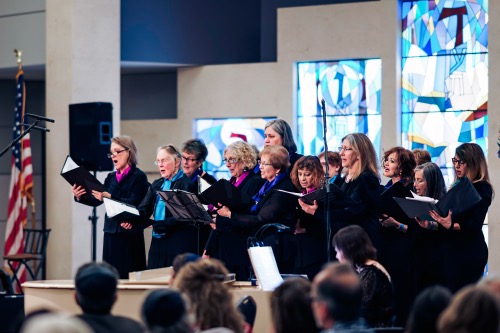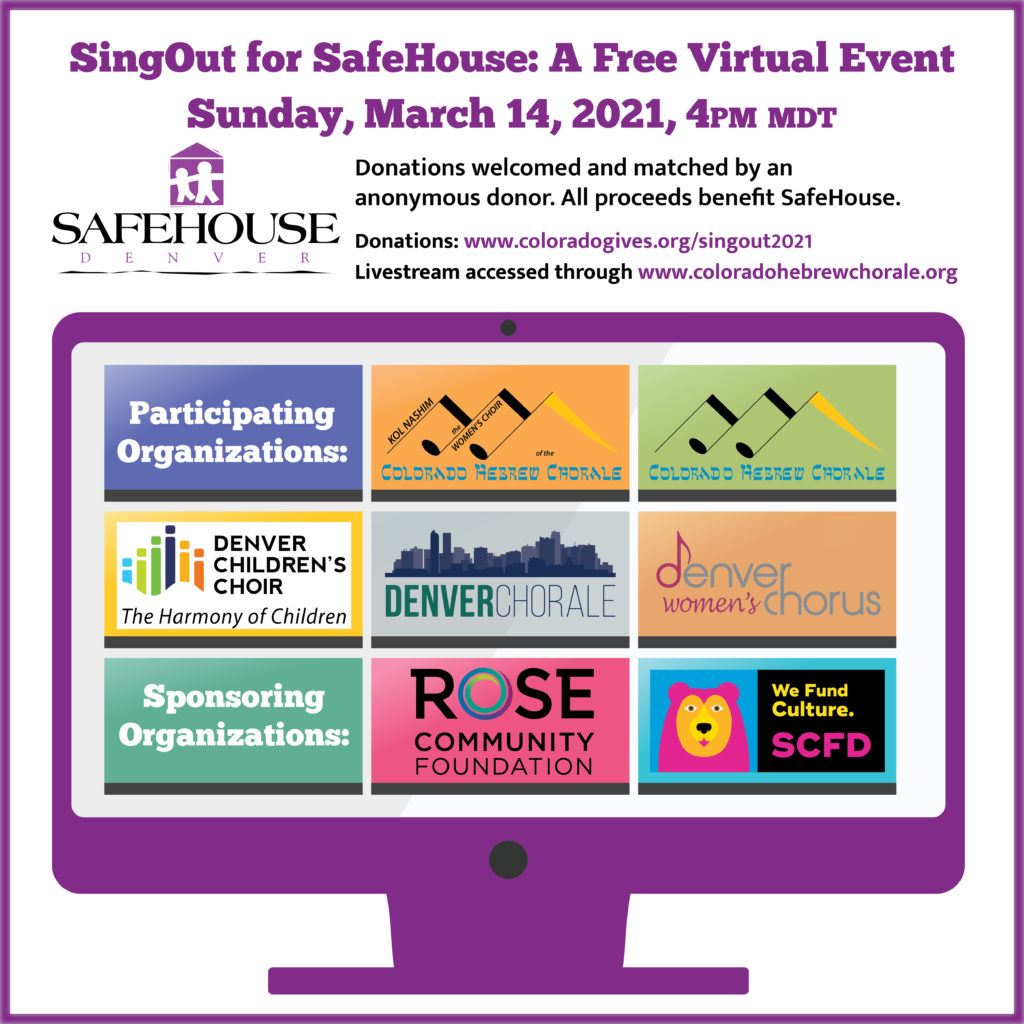Singing Out for SafeHouse – Even from a Distance
A preview by Betsy Schwarm
Most of those who are emotionally invested in the performing arts can remember the day the music died. No, not that 1959 plane crash memorialized in the 1971 Don McLean song. In this case, it was mid-March of 2020, when a global pandemic abruptly led to the cancellation of myriad live performances, then half seasons, then entire seasons for the following year. The result was tears in our hearts for lost opportunities, both as performers and as audience members. Then there were financial issues, not just for performers and their support staffs. What about other organizations that had relied on live music and live audiences as part of fundraising campaigns? There, too, were losses, though better news is on the horizon for at least one such event.

In 2017, Kol Nashim, the women’s choir of the Colorado Hebrew Chorale, launched the biennial, collaborative concert Sing Out for SafeHouse, benefiting the Denver organization that provides assistance for survivors of domestic violence and their children. Rehearsals for the 2020 event were well underway, involving some 300 voices from five area women’s choirs. Just a few days before the scheduled performance, everything shut down for COVID-19. Kol Nashim’s conductor Leah Peer admits that it was “immensely difficult” to cancel the event. However, she gradually came to imagine ways to offer the music itself through online options. With the support of SCFD and Rose Community Foundation, voices would rise again in song, even if to a distanced audience.

It was too late for 2020, but not for 2021. The re-imagined Sing Out for SafeHouse will take place as a livestream online event the afternoon of Sunday, March 14. There will still be five choirs, if not the exact same five that were originally planned. For the 2021 event, Kol Nashim and the Colorado Hebrew Chorale will be joined by the Denver Chorale, the Denver Women’s Chorus, and the Denver Children’s Choir Fourteeners. So it is no longer all female voices, but men, too, can sing out for a good cause.
Each choir brings its own contributions to the program, including Simon and Garfunkel’s “Bridge Over Troubled Water,” Stephen Flaherty’s “Make Them Hear You” from the musical Ragtime, John Rutter’s “For the Beauty of the Earth,” and other works, not yet finalized at press time Alas, social distancing not only keeps the audience at digital reach, but also the choirs. It didn’t prove practical for all the choirs, singing from afar, to join forces in any single work all together: there would have been serious logistical challenges. Each of the choirs will perform remotely and separately from the others, rather than the now familiar Brady Bunch screen arrangement. However, Kol Nashim conductor Leah Peer hopes to lead everyone – audience included – in a short sing-along

Perhaps the featured work will be the premiere of something Denver composer Nili Abrahamsson wrote specifically for the program. Baruch She’asani Isha (Women’s Song) sets a poem written in 1969 by Israeli poet Esther Raab. Upon encountering the text, Abrahamsson says she was “taken by the beauty of the expression and by the perfect fit for a woman’s choir dedicated to preserving and promoting Jewish and Hebrew music.” The poet’s nephew and executor of her estate, Ehud Ben-Ezer, “graciously and warmly consented” to Abrahamsson’s request for permission to set the verses.
The Hebrew text represents the voice of a grown woman who rejoices in being a woman and also reflects upon the girl that still lives in her heart. Composer Abrahamsson says she wished to “give each section of the choir something interesting in its own right.” So no section is more important than any other: it is an ensemble effort. As for Peer, she remarks upon how the composer has deftly used musical colors and moods to reflect upon the words and phrases being sung at any moment. Suggestions of a cricket are evoked by short, staccato notes, whereas erotic awakening has a breathless character. Abrahamsson also juxtaposes one section of the choir against another, so that they emphasize each other’s previous statements by echoing them. Some amateur choirs might not be up to such complexities; however, being Kol Nashim’s accompanist, Abrahamsson was confident in the ensemble’s ability to master what she had written.
Sing Out for SafeHouse is scheduled for Sunday, March 14, 2021 at 4pm. The livestream will be accessible here:
Currently the rectangle with purple type allows you to set a reminder; however, that space will become a live link ten minutes before the Sing Out program begins. The livestream will be offered free of charge, though viewers (and others) are urged to make a donation to SafeHouse through the provided link: www.coloradogives.org/singout2021. Donations will be matched.
Kol Nashim conductor Leah Peer remarks that this past year of pandemic-related challenges “has really brought home what the research has been telling us – getting together to make music does so many good things for us, socially, emotionally, spiritually and physically. When our season came to an abrupt end, I immediately started worrying about the impact on my singers…There are those who live alone and depend on rehearsals as a support system, there are those who have shared with me their struggles with assorted emotional and family issues, who depend on rehearsal as a pressure valve.” Peer also remarks of singing voices that “if you don’t use it you lose it,” and thus had additional concerns about the effects of a long hiatus. Practicing even at home for the Sing Out program would be good for morale and for the vocal cords, as well.
As SafeHouse representative Heather Schreck observes, “The importance of the Sing Out for SafeHouse event is the connection of community and healing. On the one hand, you have five choirs representing hundreds of people and using their voices in song for survivors. Music heals, and I believe that’s what makes this event so unique. And on the other, it raises incredible awareness and funds, allowing survivors to receive life-saving services at no cost to them. It’s a beautiful way to uplift survivors and bring the community together.” Enjoy the Sing Out for SafeHouse livestream March 14, and give what you can to an organization that may well be benefiting people you personally know.








